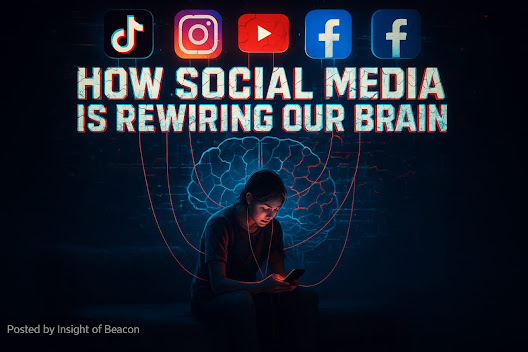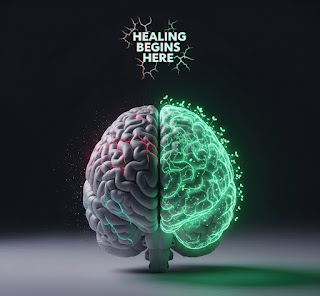Scroll, Click, Get Addicted: How Social Media Is Rewiring Our Brain:
If you’re reading this, do me a favor:
Just don’t click for 7 minutes. No swiping, no checking Instagram “for a second.” Just bear with me because what I’m about to say is something you’ve probably already felt, but haven’t yet put into words.
___________________________________________________________________________________
Have you ever opened your phone to check a message… and then suddenly an hour later your neck starts to hurt, your eyes are dry, and you’ve seen:
- A man make a sandwich seven different ways
- A cat drive a toy car
And now you’re not even sure why you picked up the phone in the first place?
Yep,Same here.
I’m not writing this from a lofty position. I’m writing this because I’m in it too. I'm addicted - not in a dramatic way like you see in the movies - but in that subtle, quiet kind of addiction that eats away at your daily habits, your sleeping schedule, your mental clarity, and worst of all... your self-esteem.
___________________________________________________________________________________
The Scroll That Stole My Morning
There was a time when I would wake up, stretch, sit by the window, and journal. I look like a monk now, but this little ritual brought me peace. I opened my eyes and my hand automatically reached for my phone. Before I knew it, I was lost in a loop of reels, memes, and people I didn’t know.
And the weird part? I don’t even know the half of it. But I can’t stop.
It’s not just a “bad habit.” It’s rewiring.
___________________________________________________________________________________
Dopamine On Demand
Here’s the science (but don’t worry — I won’t bore you): Every time you get a like, or see something interesting, your brain releases a little hit of the “feel-good” chemical dopamine. It’s like your brain is saying, “Hey, that felt good. Let’s do it again.”
The problem? It creates a cycle that’s hard to break. Our brains now expect constant stimulation. Silence feels awkward. Boredom feels painful. And reading an entire article (like this) suddenly feels like a chore.
How Social Media Hooks Your Brain (Scientifically)
Social media addiction works much like gambling or drugs — by hijacking your brain’s reward system.
Every like, comment, or notification gives you a hit of dopamine — the “feel-good” chemical. But it’s not the reward that gets you hooked… it’s the anticipation of what’s next. It’s called the “slot machine effect” and it’s been shown to be highly addictive.
___________________________________________________________________________________
I miss my attention span:
If a YouTube video is longer than 5 minutes, I sigh like I’m being told to run a marathon. Even when watching a 3-minute video, I check how much time is left. Why?
Because my brain is now trained for instant hits – short, fast, endless content.
Social media hasn’t just stolen my time, it’s broken my focus.
___________________________________________________________________________________
So Who's Winning?
You might think it's harmless scrolling. But while we're swiping, someone is making millions off our attention. Our emotions are being shaped by algorithms. And we're comparing ourselves to filtered perfection 24/7, wondering why we feel "not good enough."
This isn't a rant against social media. It's amazing in so many ways that we've lost control of the steering wheel. And now? It's driving us.
___________________________________________________________________________________
So What Can We Do?
Delete social media application?
Absolutely not...
I’m not going to preach a digital detox or tell you to delete everything (even though I’m not ready for that yet). But we can start small:
- Put your phone in another room when you sleep.
- Turn off unnecessary notifications.
- Take a 1-hour “scroll break” every day. No apps, just you.
- Become more conscious and ask, “Why am I opening this app right now?”
"I have done this,but it's not worth it"
No...
You’d be surprised ,You will see the real street of life.
___________________________________________________________________________________
When you cut back on your social media use, your brain starts to heal:
Your dopamine levels are balanced, meaning you stop needing constant stimulation to feel good. Within a few days, your focus improves, anxiety decreases, and your prefrontal cortex (the part that controls self-discipline and decision-making) becomes stronger.
A 2022 study published in Cyber-psychology, Behavior, and Social Networking found that people who took just a week off from social media had significantly lower stress levels and higher life satisfaction.
You also gain back time — not just for productivity, but for real connection, relaxation, and peace.
It’s not easy at first… but after a while, silence starts to feel good again.
If any part of this makes you feel like nodding, sighing, or just looking, then we’re already breaking the pattern because awareness is the first step.
Let’s take it back one scroll at a time.
___________________________________________________________________________________
TIME WASTED GLOBALLY:
Looks like you’re only wasting a few minutes? The numbers are shocking.
Pakistan:
According to Data Report 2024, the average social media user in Pakistan spends 3 hours and 2 minutes per day on platforms. That’s more than 45 days out of 365 just scrolling.
___________________________________________________________________________________
India:
With over 462 million social media users, Indians now spend an average of 3.5 hours per day on apps like Instagram, Facebook and YouTube. A report by Nielsen India highlights that this heavy usage is affecting work productivity and study hours, especially among young people aged 16-24.
United States:
People now spend more time on social media than they do eating, exercising or talking to family. The average American now spends 2 hours and 31 minutes per day on social platforms, which amounts to 38 full days a year.
Brazil:
The world’s top social media users, spending nearly 4 hours a day on social media. The Brazilian National Association of Psychologists reports rising levels of “scroll fatigue,” a condition linked to attention problems and emotional numbness.
___________________________________________________________________________________
It’s not just about screen time. It’s about what we’re giving up on our sleep, our focus, our creativity, and even our peace of mind. All over the world, social media is quietly making lives better, sometimes better, but often worse.
If you’ve read this far, here’s your challenge:
Try going without social media after 7pm one day this week. Write down how it felt. You might be surprised by what you see.
"Those apps were designed to be addictive. But they weren’t designed to control your mind.”
___________________________________________________________________________________


















0 Comments